高中英语阅读理解 第三部分 名人故事练习
高考英语阅读理解(人物故事)试题经典
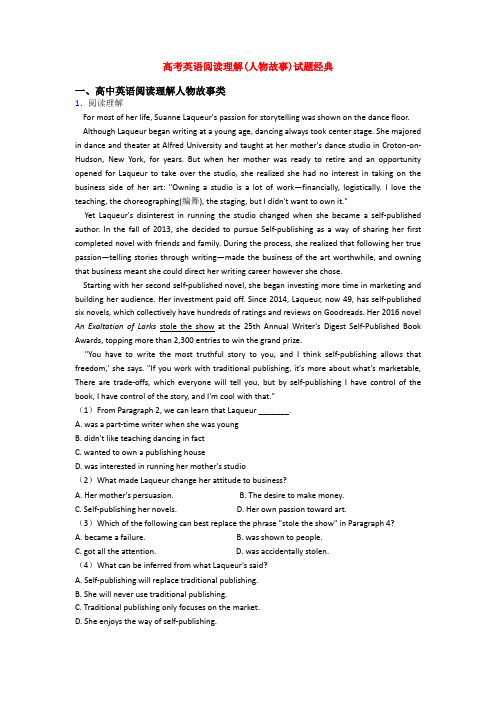
高考英语阅读理解(人物故事)试题经典一、高中英语阅读理解人物故事类1.阅读理解For most of her life, Suanne Laqueur's passion for storytelling was shown on the dance floor.Although Laqueur began writing at a young age, dancing always took center stage. She majored in dance and theater at Alfred University and taught at her mother's dance studio in Croton-on-Hudson, New York, for years. But when her mother was ready to retire and an opportunity opened for Laqueur to take over the studio, she realized she had no interest in taking on the business side of her art: "Owning a studio is a lot of work—financially, logistically. I love the teaching, the choreographing(编舞), the staging, but I didn't want to own it."Yet Laqueur's disinterest in running the studio changed when she became a self-published author. In the fall of 2013, she decided to pursue Self-publishing as a way of sharing her first completed novel with friends and family. During the process, she realized that following her true passion—telling stories through writing—made the business of the art worthwhile, and owning that business meant she could direct her writing career however she chose.Starting with her second self-published novel, she began investing more time in marketing and building her audience. Her investment paid off. Since 2014, Laqueur, now 49, has self-published six novels, which collectively have hundreds of ratings and reviews on Goodreads. Her 2016 novel An Exaltation of Larks stole the show at the 25th Annual Writer's Digest Self-Published Book Awards, topping more than 2,300 entries to win the grand prize."You have to write the most truthful story to you, and I think self-publishing allows that freedom,' she says. "If you work with traditional publishing, it's more about what's marketable, There are trade-offs, which everyone will tell you, but by self-publishing I have control of the book, I have control of the story, and I'm cool with that."(1)From Paragraph 2, we can learn that Laqueur _______.A. was a part-time writer when she was youngB. didn't like teaching dancing in factC. wanted to own a publishing houseD. was interested in running her mother's studio(2)What made Laqueur change her attitude to business?A. Her mother's persuasion.B. The desire to make money.C. Self-publishing her novels.D. Her own passion toward art.(3)Which of the following can best replace the phrase "stole the show" in Paragraph 4?A. became a failure.B. was shown to people.C. got all the attention.D. was accidentally stolen.(4)What can be inferred from what Laqueur's said?A. Self-publishing will replace traditional publishing.B. She will never use traditional publishing.C. Traditional publishing only focuses on the market.D. She enjoys the way of self-publishing.【答案】(1)A(2)C(3)C(4)D【解析】【分析】本文是一篇记叙文,苏安妮·拉克尔大半生教舞蹈,设计舞蹈,在舞台表演,以舞蹈的形式讲述故事。
英语阅读理解(人物故事)练习题含答案及解析
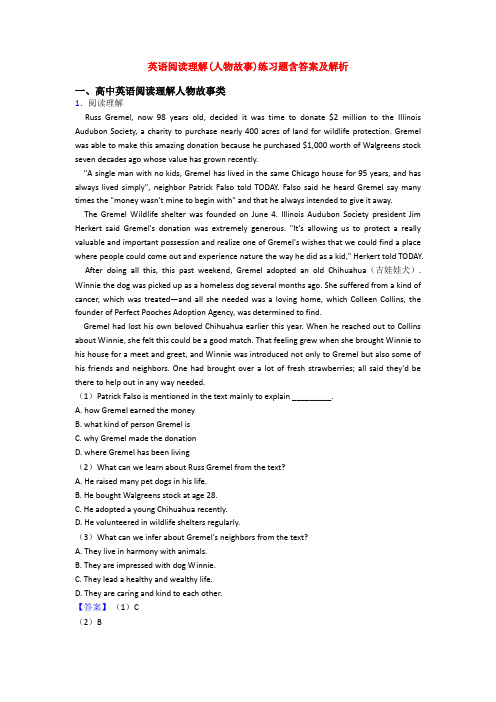
英语阅读理解(人物故事)练习题含答案及解析一、高中英语阅读理解人物故事类1.阅读理解Russ Gremel, now 98 years old, decided it was time to donate $2 million to the Illinois Audubon Society, a charity to purchase nearly 400 acres of land for wildlife protection. Gremel was able to make this amazing donation because he purchased $1,000 worth of Walgreens stock seven decades ago whose value has grown recently."A single man with no kids, Gremel has lived in the same Chicago house for 95 years, and has always lived simply", neighbor Patrick Falso told TODAY. Falso said he heard Gremel say many times the "money wasn't mine to begin with" and that he always intended to give it away.The Gremel Wildlife shelter was founded on June 4. Illinois Audubon Society president Jim Herkert said Gremel's donation was extremely generous. "It's allowing us to protect a really valuable and important possession and realize one of Gremel's wishes that we could find a place where people could come out and experience nature the way he did as a kid," Herkert told TODAY.After doing all this, this past weekend, Gremel adopted an old Chihuahua(吉娃娃犬). Winnie the dog was picked up as a homeless dog several months ago. She suffered from a kind of cancer, which was treated—and all she needed was a loving home, which Colleen Collins, the founder of Perfect Pooches Adoption Agency, was determined to find.Gremel had lost his own beloved Chihuahua earlier this year. When he reached out to Collins about Winnie, she felt this could be a good match. That feeling grew when she brought Winnie to his house for a meet and greet, and Winnie was introduced not only to Gremel but also some of his friends and neighbors. One had brought over a lot of fresh strawberries; all said they'd be there to help out in any way needed.(1)Patrick Falso is mentioned in the text mainly to explain _________.A. how Gremel earned the moneyB. what kind of person Gremel isC. why Gremel made the donationD. where Gremel has been living(2)What can we learn about Russ Gremel from the text?A. He raised many pet dogs in his life.B. He bought Walgreens stock at age 28.C. He adopted a young Chihuahua recently.D. He volunteered in wildlife shelters regularly.(3)What can we infer about Gremel's neighbors from the text?A. They live in harmony with animals.B. They are impressed with dog Winnie.C. They lead a healthy and wealthy life.D. They are caring and kind to each other.【答案】(1)C(2)B(3)D【解析】【分析】本文是一篇记叙文,格雷梅尔是一个没有孩子的单身男人,他在芝加哥同一所房子里住了95年,一直过着简朴的生活。
英语高中阅读理解(人物故事)练习题含解析
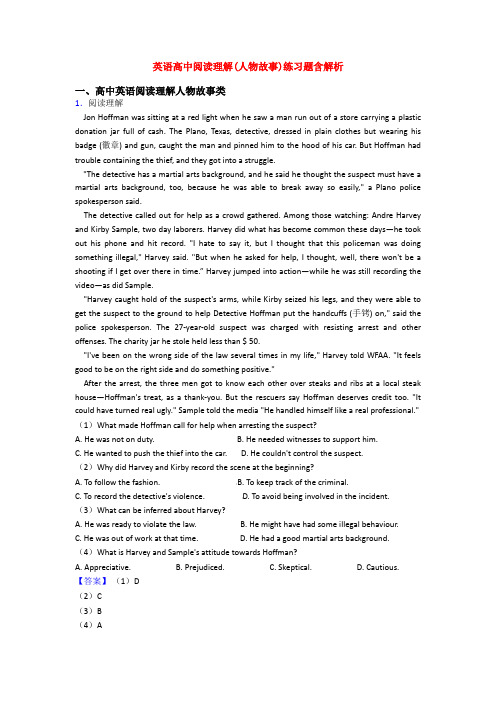
英语高中阅读理解(人物故事)练习题含解析一、高中英语阅读理解人物故事类1.阅读理解Jon Hoffman was sitting at a red light when he saw a man run out of a store carrying a plastic donation jar full of cash. The Plano, Texas, detective, dressed in plain clothes but wearing his badge (徽章) and gun, caught the man and pinned him to the hood of his car. But Hoffman had trouble containing the thief, and they got into a struggle."The detective has a martial arts background, and he said he thought the suspect must have a martial arts background, too, because he was able to break away so easily," a Plano police spokesperson said.The detective called out for help as a crowd gathered. Among those watching: Andre Harvey and Kirby Sample, two day laborers. Harvey did what has become common these days—he took out his phone and hit record. "I hate to say it, but I thought that this policeman was doing something illegal," Harvey said. "But when he asked for help, I thought, well, there won't be a shooting if I get over there in time.” Harvey jumped into action—while he was still recording the video—as did Sample."Harvey caught hold of the suspect's arms, while Kirby seized his legs, and they were able to get the suspect to the ground to help Detective Hoffman put the handcuffs (手铐) on," said the police spokesperson. The 27-year-old suspect was charged with resisting arrest and other offenses. The charity jar he stole held less than $ 50."I've been on the wrong side of the law several times in my life," Harvey told WFAA. "It feels good to be on the right side and do something positive."After the arrest, the three men got to know each other over steaks and ribs at a local steak house—Hoffman's treat, as a thank-you. But the rescuers say Hoffman deserves credit too. "It could have turned real ugly." Sample told the media "He handled himself like a real professional."(1)What made Hoffman call for help when arresting the suspect?A. He was not on duty.B. He needed witnesses to support him.C. He wanted to push the thief into the car.D. He couldn't control the suspect.(2)Why did Harvey and Kirby record the scene at the beginning?A. To follow the fashion.B. To keep track of the criminal.C. To record the detective's violence.D. To avoid being involved in the incident.(3)What can be inferred about Harvey?A. He was ready to violate the law.B. He might have had some illegal behaviour.C. He was out of work at that time.D. He had a good martial arts background.(4)What is Harvey and Sample's attitude towards Hoffman?A. Appreciative.B. Prejudiced.C. Skeptical.D. Cautious.【答案】(1)D(2)C(3)B(4)A【解析】【分析】本文是一篇记叙文,侦探Jon Hoffman在捉偷善款的小偷时遇到困难寻求帮助,Andre Harvey和 Kirby Sample帮助了他。
高三英语阅读理解(人物故事)及其解题技巧及练习题(含答案)含解析

高三英语阅读理解(人物故事)及其解题技巧及练习题(含答案)含解析一、高中英语阅读理解人物故事类1.阅读理解When I was 12 years old, I already knew that my teen years were going to be the worst years of my life. I was a total outsider, bullied (欺凌) at school. I felt completely alone in my small town.But by starting to do volunteer work when I was 14, I turned my problem into a passion for helping others. The opportunity to practice kindness made me feel like my life had a greater purpose. The more positive energy I shared, the more kindness and appreciation I received. I realized that my purpose in life would be to reach out to people, specifically teenagers, and help them feel less alone.Books were my true friends back then. I was so thankful that the authors wrote those books. The kindness they offered me with their books saved my life. One of my biggest dreams was to become an author so I could write books that would help other teenagers the way those books helped me.After surviving terrible experiences at school and at home, I made a choice to take the optimistic, positive road in the next steps of my journey. My dream career, one I thought was only possible for the authors I loved, is what I am doing now. I have been a full-time author of teen novels since 2007 and am grateful for this amazing opportunity to reach out to readers every single day.Kindness saved me when I needed help the most. Even small acts of kindness can change someone's life. You never know what someone else is going through. But by practicing daily kindness, you become an architect of positive change.(1)What was the author's life like when he was 12?A.Boring.B.Peaceful.C.Unhappy.D.Meaningful.(2)How did the volunteer work benefit the author?A.It made him popular in his town.B.It helped him find the meaning of life.C.It helped him understand others' lives better.D.It helped to shape his dream career.(3)Why did the author choose writing as his job?A.He was inspired by his teacher.B.He could pass positive energy to readers.C.He wanted to share his school experiences.D.He found he had a talent for writing.(4)What does the author suggest readers do in the last paragraph?A.Say 'no' to bullies bravely.B.Make positive changes in their lives.C.Treat others with kindness in daily life.D.Learn to care more about others' feelings.【答案】(1)C(2)B(3)B(4)C【解析】【分析】本文是一篇记叙文,作者讲述了自己参加志愿活动的经历,告诉人们:一次小善举也可能改变一个人的一生。
高三英语阅读理解(人物故事)专题训练答案及解析
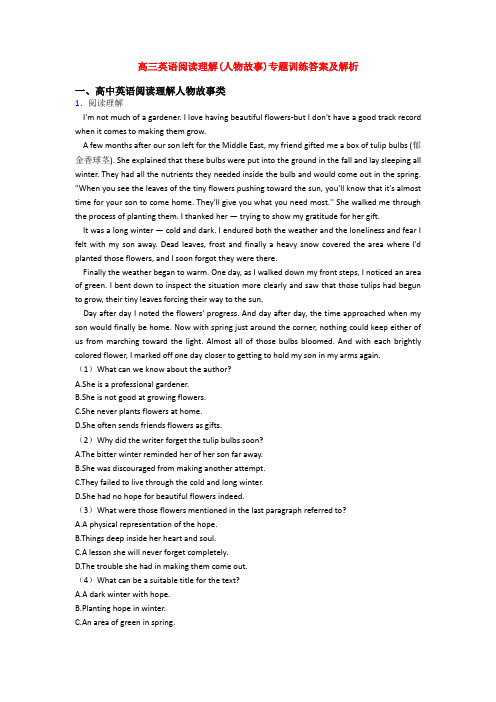
高三英语阅读理解(人物故事)专题训练答案及解析一、高中英语阅读理解人物故事类1.阅读理解I'm not much of a gardener. I love having beautiful flowers-but I don't have a good track record when it comes to making them grow.A few months after our son left for the Middle East, my friend gifted me a box of tulip bulbs (郁金香球茎). She explained that these bulbs were put into the ground in the fall and lay sleeping all winter. They had all the nutrients they needed inside the bulb and would come out in the spring. ''When you see the leaves of the tiny flowers pushing toward the sun, you'll know that it's almost time for your son to come home. They'll give you what you need most.'' She walked me through the process of planting them. I thanked her — trying to show my gratitude for her gift.It was a long winter — cold and dark. I endured both the weather and the loneliness and fear I felt with my son away. Dead leaves, frost and finally a heavy snow covered the area where I'd planted those flowers, and I soon forgot they were there.Finally the weather began to warm. One day, as I walked down my front steps, I noticed an area of green. I bent down to inspect the situation more clearly and saw that those tulips had begun to grow, their tiny leaves forcing their way to the sun.Day after day I noted the flowers' progress. And day after day, the time approached when my son would finally be home. Now with spring just around the corner, nothing could keep either of us from marching toward the light. Almost all of those bulbs bloomed. And with each brightly colored flower, I marked off one day closer to getting to hold my son in my arms again.(1)What can we know about the author?A.She is a professional gardener.B.She is not good at growing flowers.C.She never plants flowers at home.D.She often sends friends flowers as gifts.(2)Why did the writer forget the tulip bulbs soon?A.The bitter winter reminded her of her son far away.B.She was discouraged from making another attempt.C.They failed to live through the cold and long winter.D.She had no hope for beautiful flowers indeed.(3)What were those flowers mentioned in the last paragraph referred to?A.A physical representation of the hope.B.Things deep inside her heart and soul.C.A lesson she will never forget completely.D.The trouble she had in making them come out.(4)What can be a suitable title for the text?A.A dark winter with hope.B.Planting hope in winter.C.An area of green in spring.D.Living a changeable life.【答案】(1)B(2)D(3)A(4)B【解析】【分析】本文是一篇记叙文,作者的儿子去了中东,作者感到孤独和寂寞。
高中英语阅读理解(人物故事)的技巧及练习题及练习题(含答案)含解析
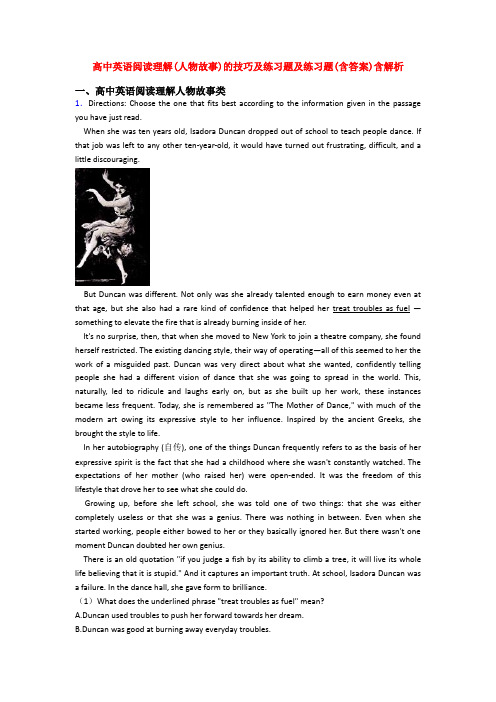
高中英语阅读理解(人物故事)的技巧及练习题及练习题(含答案)含解析一、高中英语阅读理解人物故事类1.Directions: Choose the one that fits best according to the information given in the passage you have just read.When she was ten years old, Isadora Duncan dropped out of school to teach people dance. If that job was left to any other ten-year-old, it would have turned out frustrating, difficult, and a little discouraging.But Duncan was different. Not only was she already talented enough to earn money even at that age, but she also had a rare kind of confidence that helped her treat troubles as fuel —something to elevate the fire that is already burning inside of her.It's no surprise, then, that when she moved to New York to join a theatre company, she found herself restricted. The existing dancing style, their way of operating—all of this seemed to her the work of a misguided past. Duncan was very direct about what she wanted, confidently telling people she had a different vision of dance that she was going to spread in the world. This, naturally, led to ridicule and laughs early on, but as she built up her work, these instances became less frequent. Today, she is remembered as "The Mother of Dance," with much of the modern art owing its expressive style to her influence. Inspired by the ancient Greeks, she brought the style to life.In her autobiography (自传), one of the things Duncan frequently refers to as the basis of her expressive spirit is the fact that she had a childhood where she wasn't constantly watched. The expectations of her mother (who raised her) were open-ended. It was the freedom of this lifestyle that drove her to see what she could do.Growing up, before she left school, she was told one of two things: that she was either completely useless or that she was a genius. There was nothing in between. Even when she started working, people either bowed to her or they basically ignored her. But there wasn't one moment Duncan doubted her own genius.There is an old quotation "if you judge a fish by its ability to climb a tree, it will live its whole life believing that it is stupid." And it captures an important truth. At school, Isadora Duncan was a failure. In the dance hall, she gave form to brilliance.(1)What does the underlined phrase "treat troubles as fuel" mean?A.Duncan used troubles to push her forward towards her dream.B.Duncan was good at burning away everyday troubles.C.Troubles turned Duncan into a confident girl.D.Troubles lit the fire of dancing in Duncan.(2)Which of the following is TRUE about Duncan?A.Her experience in New York was the foundation of her career.B.Her teaching job when she was little destroyed her confidence.C.Her dancing style was not very well received at the beginning.D.Her mother set higher expectation on her than she could bear.(3)What does the author try to tell the readers in the last paragraph?A.It is useless climbing a tree to catch fish.B.Everybody is a genius in his own way.C.Miseries come from human stupidity.D.Teachers can impact students greatly.(4)What is this passage mainly about?A.Isadora Duncan's childhood and her achievements today.B.Duncan's career development and other dancers' opinions of her.C.Isadora Duncan's early experiences and the reasons for her success.D.Duncan's high status in the dancing world and her unique expressive style.【答案】(1)A(2)C(3)B(4)C【解析】【分析】本文是一篇记叙文,伊莎多拉·邓肯十岁时辍学去教别人跳舞,作者讲述了她的早期的经历以及其取得成功的原因。
高三英语阅读理解(人物故事)的技巧及练习题及练习题(含答案)含解析

高三英语阅读理解(人物故事)的技巧及练习题及练习题(含答案)含解析一、高中英语阅读理解人物故事类1.阅读理解The great-grandmother is learning English with the help of her family when she is at the age of 91. She hopes to use the language at next year's Olympic Games in Tokyo. Takamizawa was one of the more than 200, 00 people who requested to volunteer for Tokyo's 2020 Games. English is not required for service, but it is a useful skill for volunteers to have.But Takamizawa had not been able to learn the language when she was young. Takamizawa said that she was in high school when World War Two started. She said, "In my second year there, English was banned because it was the enemy language."Takamizawa said her grandchildren helped persuade her that she was not too old to learn. "When I talked to my grandchildren about my wish, they said, 'It's not too late. We will teach you one word a day' ". Natsuko is Takamizawa's granddaughter and main English teacher. Natsuko sends a new English word to her grandmother's phone every day. They also often work together directly on phrases that Takamizawa will need for the Olympics. "Welcome to Tokyo, this is the Olympic stadium, how can I help you?" Takamizawa answers when asked to say an English phrase she has learned. Natsuko explains that she wanted to give her grandmother something to enjoy. "I can clearly see her English is getting better. It's my joy now."The EF English Proficiency Index is a measure of the level of English spoken in a country. Japan ranks 49th among countries where English is not the first language. This situation is slowly changing as younger generations welcome English. However, Takamizawa believes real change will not happen unless Japanese people become more open to the rest of the world. With around 500 days to go until the games begin, the whole Takamizawa family is ready to welcome the world to Tokyo.(1)Why couldn't Takamizawa learn English when she was young?A. Because English was useless.B. Because she was too young to learn English.C. Because English was forbidden to learn.D. Because she was unwilling to learn English.(2)What can we know from the third paragraph?A. Takamizawa gets strong support from her family.B. Takamizawa's grandchildren love her a lot.C. Natsuko is Takamizawa's granddaughter and only English teacher.D. Natsuko teaches Takamizawa English mainly by talking with her.(3)What does the underlined phrase "This situation" in Paragraph 4 refer to?A. English is not the first language in Japan.B. The level of English spoken in Japan is relatively low.C. Younger generations in Japan welcome English.D. Japanese people become open to the rest of the world.(4)What is the main idea of the passage?A. Where there is a will, there is a way.B. It is never too late to learn.C. The early bird catches the worm.D. Two heads are better than one.【答案】(1)C(2)A(3)B(4)B【解析】【分析】本文是一篇记叙文,日本91岁的奶奶Takamizawa为了做好迎接在东京举行的2020奥运会的志愿工作,在孙辈的鼓励和帮助下开始学习英语。
高中英语阅读理解 第三部分 名人故事(一)练习
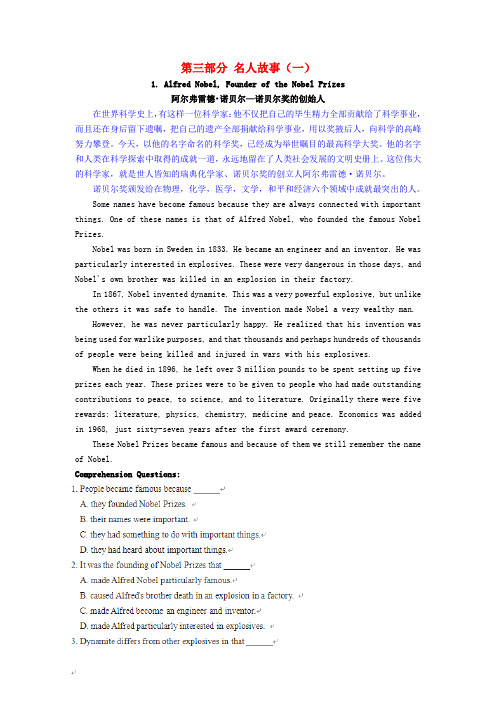
第三部分名人故事(一)1. Alfred Nobel, Founder of the Nobel Prizes阿尔弗雷德•诺贝尔—诺贝尔奖的创始人在世界科学史上,有这样一位科学家:他不仅把自己的毕生精力全部贡献给了科学事业,而且还在身后留下遗嘱,把自己的遗产全部捐献给科学事业,用以奖掖后人,向科学的高峰努力攀登。
今天,以他的名字命名的科学奖,已经成为举世瞩目的最高科学大奖。
他的名字和人类在科学探索中取得的成就一道,永远地留在了人类社会发展的文明史册上。
这位伟大的科学家,就是世人皆知的瑞典化学家、诺贝尔奖的创立人阿尔弗雷德·诺贝尔。
诺贝尔奖颁发给在物理,化学,医学,文学,和平和经济六个领域中成就最突出的人。
Some names have become famous because they are always connected with important things. One of these names is that of Alfred Nobel, who founded the famous Nobel Prizes.Nobel was born in Sweden in 1833. He became an engineer and an inventor. He was particularly interested in explosives. These were very dangerous in those days, and Nobel's own brother was killed in an explosion in their factory.In 1867, Nobel invented dynamite. This was a very powerful explosive, but unlike the others it was safe to handle. The invention made Nobel a very wealthy man.However, he was never particularly happy. He realized that his invention was being used for warlike purposes, and that thousands and perhaps hundreds of thousands of people were being killed and injured in wars with his explosives.When he died in 1896, he left over 3 million pounds to be spent setting up five prizes each year. These prizes were to be given to people who had made outstanding contributions to peace, to science, and to literature. Originally there were five rewards: literature, physics, chemistry, medicine and peace. Economics was added in 1968, just sixty-seven years after the first award ceremony.These Nobel Prizes became famous and because of them we still remember the name of Nobel.Comprehension Questions:A. it is less powerful and safe to handle.B. it is more powerful but less safe to handle.C. it is both powerful and safe.D. it won't kill people.4. Rich as he was, Alfred Nobel was never particularly happy because ______A. his dynamite was not safe enough.B. his explosives were being used in wars.C. his brother was killed by the explosives invented by him.D. he had killed hundreds of thousands of people with explosives.5. Those who had made outstanding contributions to peace, to science and to literature ______A. could get three million pounds.B. were given five prizes each year.C. could see Alfred Nobel himself.D. could receive Nobel Prizes.(CACBD)2. The General and the Corporal, A StoryAbout George Washington将军和下士—乔治•华盛顿的故事乔治·华盛顿,美国首任总统(1789~1797),美国独立战争大陆军总司令。
高中英语阅读理解第三部分名人故事(二)练习
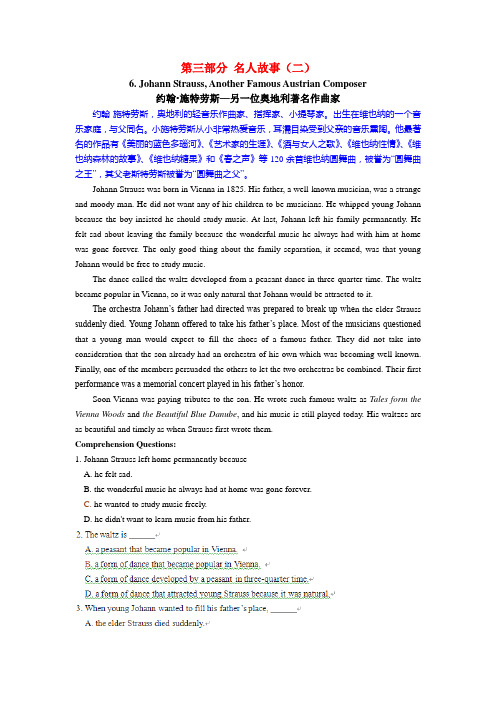
第三部分名人故事(二)6. Johann Strauss, Another Famous Austrian Composer约翰•施特劳斯—另一位奥地利著名作曲家约翰·施特劳斯,奥地利的轻音乐作曲家、指挥家、小提琴家。
出生在维也纳的一个音乐家庭,与父同名。
小施特劳斯从小非常热爱音乐,耳濡目染受到父亲的音乐熏陶。
他最著名的作品有《美丽的蓝色多瑙河》、《艺术家的生涯》、《酒与女人之歌》、《维也纳性情》、《维也纳森林的故事》、《维也纳糖果》和《春之声》等120余首维也纳圆舞曲,被誉为“圆舞曲之王”,其父老斯特劳斯被誉为“圆舞曲之父”。
Johann Strauss was born in Vienna in 1825. His father, a well-known musician, was a strange and moody man. He did not want any of his children to be musicians. He whipped young Johann because the boy insisted he should study music. At last, Johann left his family permanently. He felt sad about leaving the family because the wonderful music he always had with him at home was gone forever. The only good thing about the family separation, it seemed, was that young Johann would be free to study music.The dance called the waltz developed from a peasant dance in three-quarter time. The waltz became popular in Vienna, so it was only natural that Johann would be attracted to it.The orchestra Johann’s father had directed was prepared to break up whe n the elder Strauss suddenly died. Young Johann offered to take his father’s place. Most of the musicians questioned that a young man would expect to fill the shoes of a famous father. They did not take into consideration that the son already had an orchestra of his own which was becoming well known. Finally, one of the members persuaded the others to let the two orchestras be combined. Their first performance was a memorial concert played in his father’s honor.Soon Vienna was paying tributes to the son. He wrote such famous waltz as Tales form the Vienna Woods and the Beautiful Blue Danube, and his music is still played today. His waltzes are as beautiful and timely as when Strauss first wrote them.Comprehension Questions:1. Johann Strauss left home permanently because ______A. he felt sad.B. the wonderful music he always had at home was gone forever.C. he wanted to study music freely.D. he didn't want to learn music from his father.B. most musicians didn't believe that young Strauss' feet were as big as his father's.C. most of the musicians thought he was unable to do so.D. most of the musicians considered him able to do so.4. Johann directed the first performance of the newly combined orchestra ______A. because people didn't believe his ability.B. because one of the members persuaded the others to let him direct the orchestra.C. in memory of his father.D. because he could enjoy the honor of his father.5. Tales from the Vienna Woods is ______A. a collection of stories written by Johann Strauss.B. a piece of famous waltz by Johann Strauss.C. as good a story as The Beautiful Blue Danube.D. a piece of beautiful waltz written first by Johann Strauss.(CBCCB)7. Charles Chaplin, King of the Film World查理•卓别林—电影之王查理·卓别林,英国电影演员,导演和制片人。
英语阅读理解(人物故事)专题练习(及答案)含解析

英语阅读理解(人物故事)专题练习(及答案)含解析一、高中英语阅读理解人物故事类1.阅读下列短文,从每题所给的A、B、C和D四个选项中,选出最佳选项。
The new president of Harvard University is the son of an Eastern European refugee and Auschwitz (奥斯威辛) survivor—Lawrence S. Bacow. His father worked full time while attending a state college in Detroit at night to earn his degree.Bacow, the former president of Tufts University, has taken over Harvard at a time when higher education is under attack for being financially out of reach to many Americans. But Bacow said his family's journey had reflected the power of college education to transform generations and the opportunities that have historically been available in the United States."My parents came to this country with almost nothing," Bacow said. "I wouldn't be here if this country had not been open to people like my parents at that time. Nor would I if my father hadn't had the opportunity to get the college education."Bacow grew up in Pontiac, Michigan. His father's family fled anti-Jewish (反犹太的) violence in Minsk, then part of the Soviet Union, before the start of World War II and went to the United States. His mother arrived in Brooklyn at age 19, having survived Auschwitz concentration camp. She was the only Jew from her town to have survived the war. Yet Bacow, who is married with two sons, said that while growing up in Michigan, he had a happy childhood, entering science fairs as a child and building radios like his dad.Bacow has spent most of his professional career at MIT, Harvard and Tufts. He was a professor of environmental studies at MIT, and later a principal at the university. He led Tufts from 2001 to 2011. At Tufts, Bacow earned a reputation for shaking up a sleepy university that was being overshadowed by its peers in Boston. He is also credited with leading it through both 9/11 and the 2008 financial crisis.As the Tufts president, Bacow traveled around the country, reaching out to alumni (校友), and he urged his faculty and deans to do the same, in an effort to boost donations to finance Tufts' academic ambitions. He raised more than $20 million for faculty recruitment, attracting up-and-coming professors by offering junior faculty perks (福利), such as long academic leaves that they couldn't get elsewhere.Under Bacow's leadership, Tufts spent millions on labs and libraries. He also made addresses nationally about the need to make higher education more accessible and affordable to low-income students.(1)The reason why Bacow appreciates college education is that ________.A. college education is out of reach to many AmericansB. his family changed their fate due to college educationC. few opportunities were available when his father came into the countryD. a college degree helped his mother survive Auschwitz(2)What can we infer from the passage?A. The fellow townspeople of Bacow were all killed besides his mother.B. Bacow's mother stimulated his interest in science.C. Bacow's father was good at working with electronics.D. Bacow's father came to the U.S. after World War II broke out.(3)The underlined word "shaking up" in paragraph 5 probably means ________.A. reactivatingB. causingC. damagingD. taking over(4)What is this passage mainly about?A. How to be admitted to Harvard University.B. The history of Bacow's family.C. The art of Bacow's leadership in Tufts.D. Bacow's way to individual success.【答案】(1)B(2)C(3)A(4)D【解析】【分析】本文是一篇名人传记,讲述了Bacow的个人成功之路。
2015年高中英语阅读理解第三部分名人故事(二)练习
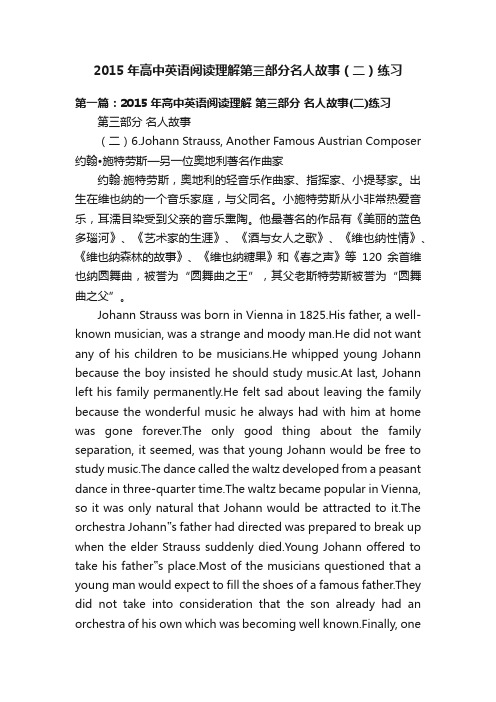
2015年高中英语阅读理解第三部分名人故事(二)练习第一篇:2015年高中英语阅读理解第三部分名人故事(二)练习第三部分名人故事(二)6.Johann Strauss, Another Famous Austrian Composer 约翰•施特劳斯—另一位奥地利著名作曲家约翰·施特劳斯,奥地利的轻音乐作曲家、指挥家、小提琴家。
出生在维也纳的一个音乐家庭,与父同名。
小施特劳斯从小非常热爱音乐,耳濡目染受到父亲的音乐熏陶。
他最著名的作品有《美丽的蓝色多瑙河》、《艺术家的生涯》、《酒与女人之歌》、《维也纳性情》、《维也纳森林的故事》、《维也纳糖果》和《春之声》等120余首维也纳圆舞曲,被誉为“圆舞曲之王”,其父老斯特劳斯被誉为“圆舞曲之父”。
Johann Strauss was born in Vienna in 1825.His father, a well-known musician, was a strange and moody man.He did not want any of his children to be musicians.He whipped young Johann because the boy insisted he should study music.At last, Johann left his family permanently.He felt sad about leaving the family because the wonderful music he always had with him at home was gone forever.The only good thing about the family separation, it seemed, was that young Johann would be free to study music.The dance called the waltz developed from a peasant dance in three-quarter time.The waltz became popular in Vienna, so it was only natural that Johann would be attracted to it.The orchestra Johann‟s father had directed was prepared to break up when the elder Strauss suddenly died.Young Johann offered to take his father‟s place.Most of the musicians questioned that a young man would expect to fill the shoes of a famous father.They did not take into consideration that the son already had an orchestra of his own which was becoming well known.Finally, oneof the members persuaded the others to let the two orchestras be combined.Their first performance was a memorial concert played in his father‟s honor.Soon Vienna was paying tributes to the son.He wrote such famous waltz as Tales form the Vienna Woods and the Beautiful Blue Danube, and his music is still played today.His waltzes are as beautiful and timely as when Strauss first wrote prehension Questions:1.Johann Strauss left home permanently because ______ A.he felt sad.B.the wonderful music he always had at home was gone forever.C.he wanted to study music freely.D.he didn't want to learn music from his father.B.most musicians didn't believe that young Strauss' feet were as big as his father's.C.most of the musicians thought he was unable to do so.D.most of the musicians considered him able to do so.4.Johann directed the first performance of the newly combined orchestra ______ A.because people didn't believe his ability.B.because one of the members persuaded the others to let him direct the orchestra.C.in memory of his father.D.because he could enjoy the honor of his father.5.Tales from the Vienna Woods is ______ A.a collection of stories written by Johann Strauss.B.a piece of famous waltz by Johann Strauss.C.as good a story as The Beautiful Blue Danube.D.a piece of beautiful waltz written first by Johann Strauss.(CBCCB)7.Charles Chaplin, King of the Film World 查理•卓别林—电影之王查理·卓别林,英国电影演员,导演和制片人。
高中英语阅读理解 第三部分 名人故事(六)练习
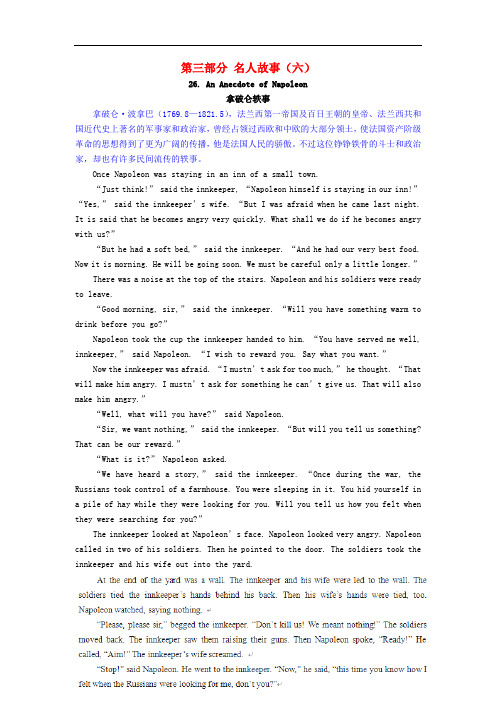
第三部分名人故事(六)26. An Anecdote of Napoleon拿破仑轶事拿破仑·波拿巴(1769.8—1821.5),法兰西第一帝国及百日王朝的皇帝、法兰西共和国近代史上著名的军事家和政治家,曾经占领过西欧和中欧的大部分领土,使法国资产阶级革命的思想得到了更为广阔的传播,他是法国人民的骄傲。
不过这位铮铮铁骨的斗士和政治家,却也有许多民间流传的轶事。
Once Napoleon was staying in an inn of a small town.“Just think!”said the innkeeper, “Napoleon himself is staying in our inn!”“Yes,” said the innkeeper’s wife. “But I was afraid when he came last night. It is said that he becomes angry very quickly. What shall we do if he becomes angry with us?”“But he had a soft bed,”said the innkeeper. “And he had our very best food. Now it is morning. He will be going soon. We must be careful only a little longer.”There was a noise at the top of the stairs. Napoleon and his soldiers were ready to leave.“Good morning, sir,” said the innkeeper. “Will you have something warm to drink before you go?”Napoleon took the cup the innkeeper handed to him. “You have served me well, innkeeper,” said Napoleon. “I wish to reward you. Say what you want.”Now the innkeeper was afraid. “I mustn’t ask for too much,”he thought. “That will make him angry. I mustn’t ask for something he can’t give us. That will also make him angry.”“Well, what will you have?” said Napoleon.“Sir, we want nothing,”said the innkeeper. “But will you tell us something? That can be our reward.”“What is it?” Napoleon asked.“We have heard a story,” said the innkeeper. “Once during the war, the Russians took control of a farmhouse. You were sleeping in it. You hid yourself in a pile of hay while they were looking for you. Will you tell us how you felt when they were searching for you?”The innkeeper looked at Napoleon’s face. Napoleon looked very angry. Napoleon called in two of his soldiers. Then he pointed to the door. The soldiers took the innkeeper and his wife out into the yard.Comprehension Questions:1. The innkeeper’s wife was afraid of Napoleon because ______A. they hadn’t served him very well.B. they had done something wrong to him.C. he became angry very easily.D. he was a great man.2. The innkeeper and his wife must have been ______A. frightened by Napoleon’s arrival.B. pleased with Napoleon’s answer.C. glad about Napoleon’s stay.D. interested in at what Napoleon had done.3. The two soldiers ______A. understood Napoleon well.B. didn’t know why Napoleon wanted to kill them.C. could do nothing but kill the husband and wife.D. were badly treated by the innkeeper.4. While the Russians were searching for him, Napoleon ______A. ordered his men to fight back.B. were frightened to death.C. feared nothing.D. regretted having hidden there.5. According to the passage, we know that Napoleon ______A. was cruel to the innkeeper.B. was kind to the innkeeper.C. was brave before the Russians.D. expressed himself in a cruel way.(CCABD)27. Sherlock Holmes, Famous Detective in Conan Doyle’s Works夏洛克•福尔摩斯—英国作家柯南道尔作品中的名侦探fact, more famous than his own creator, Sir Arthur Conan Doyle.In the popular stories, Holmes is described as “tall and lean, pipe-smoking, always in his cape, and speaks in a splendid manner.”Doyle gave Holmes the address as 221-B Baker Street, London, and to this day some visitors to London still go to Baker Street to search for 221-B. Of course, there was never such an address. Holmes’flat was supposed to be shared by the lovable, but sometimes clumsy Dr. Watson who went around with Holmes trying to solve crimes before Holmes did. Poor Dr. Watson lost out to Holmes every time.Doyle gave Holmes a masterly skill of deduction---the ability to come up with interesting conclusions from the simplest clues found at the scene of a crime.Conan Doyle said that the description of Holmes was modeled on one of his lectures at Edinburgh University where he studied medicine. The man was Dr. Joseph Bell.The name of Sherlock Holmes first came to be shown in Doyle’s A Study in Scarlet Letter published in 1887. Holmes was so loved by all that when his author killed him off in one of his stories, readers wrote in angrily. They refused to allow Holmes to die! Holmes was brought back to “life” and appeared in further stories.The stories of Sherlock Holmes have been reprinted many times ever since then. Today we can watch Holmes at work on cinema and television screens as well as on stages.Comprehension Questions:1. Sherlock Holmes was ______A. the greatest detective in the world who ever lived.B. Dr. Joseph Bell.C. Arthur Conan Doyle.D. only a character made up by Arthur Conan Doyle.2. Holmes was supposed to have lived ______A. somewhere in England.B. in a small house at Edinburgh University.C. in Dr. Watson’s clinic in Baker Street.D. in a flat in Baker Street, London.B. want Holmes to die.C. want Dr. Watson to die.D. like Holmes to appear in further stories.(DDCDB)28. A Story of Sigmund Freud西格蒙德•弗洛伊德的故事西格蒙德·弗洛伊德,奥地利医生兼心理学家、哲学家、精神分析学的创始人。
【英语】高中必备英语阅读理解(人物故事)技巧全解及练习题(含答案)及解析
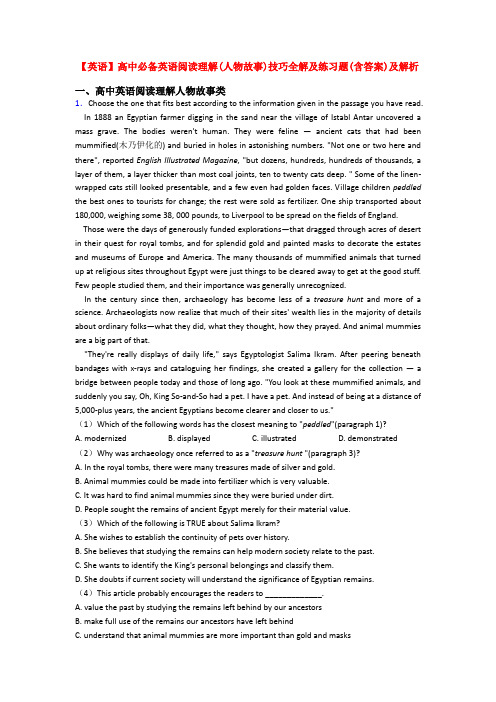
【英语】高中必备英语阅读理解(人物故事)技巧全解及练习题(含答案)及解析一、高中英语阅读理解人物故事类1.Choose the one that fits best according to the information given in the passage you have read. In 1888 an Egyptian farmer digging in the sand near the village of Istabl Antar uncovered a mass grave. The bodies weren't human. They were feline —ancient cats that had been mummified(木乃伊化的) and buried in holes in astonishing numbers. "Not one or two here and there", reported English Illustrated Magazine, "but dozens, hundreds, hundreds of thousands, a layer of them, a layer thicker than most coal joints, ten to twenty cats deep. " Some of the linen-wrapped cats still looked presentable, and a few even had golden faces. Village children peddled the best ones to tourists for change; the rest were sold as fertilizer. One ship transported about 180,000, weighing some 38, 000 pounds, to Liverpool to be spread on the fields of England.Those were the days of generously funded explorations—that dragged through acres of desert in their quest for royal tombs, and for splendid gold and painted masks to decorate the estates and museums of Europe and America. The many thousands of mummified animals that turned up at religious sites throughout Egypt were just things to be cleared away to get at the good stuff. Few people studied them, and their importance was generally unrecognized.In the century since then, archaeology has become less of a treasure hunt and more of a science. Archaeologists now realize that much of their sites' wealth lies in the majority of details about ordinary folks—what they did, what they thought, how they prayed. And animal mummies are a big part of that."They're really displays of daily life," says Egyptologist Salima Ikram. After peering beneath bandages with x-rays and cataloguing her findings, she created a gallery for the collection — a bridge between people today and those of long ago. "You look at these mummified animals, and suddenly you say, Oh, King So-and-So had a pet. I have a pet. And instead of being at a distance of 5,000-plus years, the ancient Egyptians become clearer and closer to us."(1)Which of the following words has the closest meaning to "peddled"(paragraph 1)? A. modernized B. displayed C. illustrated D. demonstrated(2)Why was archaeology once referred to as a "treasure hunt "(paragraph 3)?A. In the royal tombs, there were many treasures made of silver and gold.B. Animal mummies could be made into fertilizer which is very valuable.C. It was hard to find animal mummies since they were buried under dirt.D. People sought the remains of ancient Egypt merely for their material value.(3)Which of the following is TRUE about Salima Ikram?A. She wishes to establish the continuity of pets over history.B. She believes that studying the remains can help modern society relate to the past.C. She wants to identify the King's personal belongings and classify them.D. She doubts if current society will understand the significance of Egyptian remains.(4)This article probably encourages the readers to _____________.A. value the past by studying the remains left behind by our ancestorsB. make full use of the remains our ancestors have left behindC. understand that animal mummies are more important than gold and masksD. become more sensitive to the ancient lifestyle of our ancestors【答案】(1)B(2)D(3)B(4)A【解析】【分析】本文是一篇记叙文,自从1888年在埃及发现了猫动物的木乃伊之后,大量的皇家墓穴被挖掘,成千上万的木乃伊被运往世界各地,以攫取物质利益。
高三英语阅读理解(人物故事)的技巧及练习题及练习题(含答案)含解析

高三英语阅读理解(人物故事)的技巧及练习题及练习题(含答案)含解析一、高中英语阅读理解人物故事类1.阅读理解Imagine someone who has spent the majority of their life sitting with a sign on the side of the road and that very person giving someone their last 20 dollars. That's exactly what Marine Corps veteran (退伍军人) Johnny Bobbitt, 34, did in October in Philadelphia.Bobbitt served in the U.S. Marine Corps and worked as a paramedic (医务辅助人员) in Vance County, N. C. before he became homeless. Nobody knew how he got to where he was because he was discreet about that.One night in October, Bobbitt was sitting roadside with a sign in Philadelphia as usual, when Kate McClure of Florence Township, N. J. was driving home down Interstate 95 and ran out of gas. Scared and nervous, she got out of the car to head to the nearest gas station. As McClure was heading to the nearest gas station, she ran into Bobbitt and he told her to get back in the vehicle and lock the door. Minutes later, he appeared with a red gas can. He'd used his last $20 to buy her gas.After that unexpected meeting, McClure and her boyfriend, Mark D'Amico, who both live in New Jersey, visited Bobbitt several times to deliver gift cards, cash, snacks and toiletries. They then decided to create a fund raising page so he wouldn't have to spend the holidays sleeping on the street.McClure started the GoFundMe page on November 10. With the page, the couple hoped to raise $10,000, enough money for his rent, a reliable vehicle and up to six months' expenses. Bobbitt's story ran in a local paper. By November 15,more than 10,000 local people had made donations through the GoFundMe page and more than $300,000 had been raised.On Thanksgiving, Bobbitt was resting in a hotel, his feet up on the bed, drawing up a grand plan for his new life, thanks to several thousand dollars raised to repay him for a good deed.(1)What does the underlined word "discreet" in paragraph 2 most probably mean?A. Doubtful.B. Cautious.C. Guilty.D. Optimistic.(2)McClure met Bobbitt when she .A. couldn't find a gas stationB. got to the way homeC. couldn't unlock her carD. was in search of gas(3)It can be known from the text that .A. Bobbitt's story obtained wide attentionB. Bobbitt became world-famous overnightC. the GoFundMe page collected over $400,000 for BobbittD. the GoFundMe page was started to help people like Bobbitt(4)What is the best title for the text?A. A Homeless Veteran Paid Kindness ForwardB. A Homeless Veteran Had a Generous HeartC. A Homeless Veteran's Kindness Paid OffD. A Small Kindness Made a Big Difference【答案】(1)B(2)D(3)A(4)C【解析】【分析】本文是一篇记叙文,—个无家可归的退伍军人将身上仅有的二十美元买了汽油送给在回家途中汽车没油的年轻女子,事后这名女子和她的男朋友专门建了一个网页为他募捐,使他不用再睡在大街上。
最新高三英语阅读理解(人物故事)的技巧及练习题及练习题(含答案)含解析
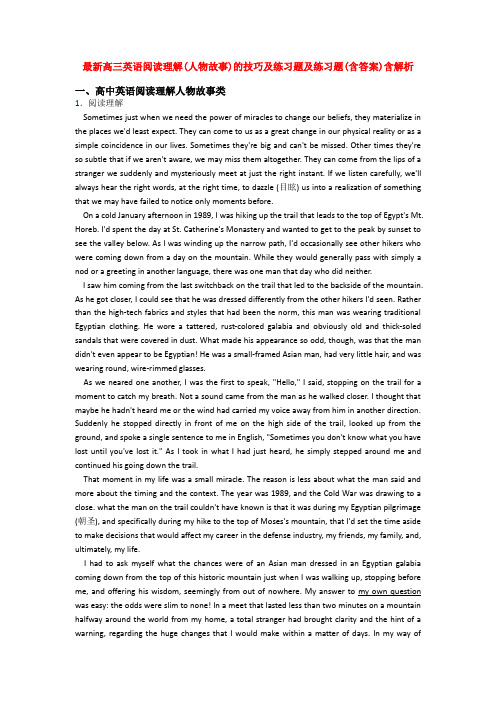
最新高三英语阅读理解(人物故事)的技巧及练习题及练习题(含答案)含解析一、高中英语阅读理解人物故事类1.阅读理解Sometimes just when we need the power of miracles to change our beliefs, they materialize in the places we'd least expect. They can come to us as a great change in our physical reality or as a simple coincidence in our lives. Sometimes they're big and can't be missed. Other times they're so subtle that if we aren't aware, we may miss them altogether. They can come from the lips of a stranger we suddenly and mysteriously meet at just the right instant. If we listen carefully, we'll always hear the right words, at the right time, to dazzle (目眩) us into a realization of something that we may have failed to notice only moments before.On a cold January afternoon in 1989, I was hiking up the trail that leads to the top of Egypt's Mt. Horeb. I'd spent the day at St. Catherine's Monastery and wanted to get to the peak by sunset to see the valley below. As I was winding up the narrow path, I'd occasionally see other hikers who were coming down from a day on the mountain. While they would generally pass with simply a nod or a greeting in another language, there was one man that day who did neither.I saw him coming from the last switchback on the trail that led to the backside of the mountain. As he got closer, I could see that he was dressed differently from the other hikers I'd seen. Rather than the high-tech fabrics and styles that had been the norm, this man was wearing traditional Egyptian clothing. He wore a tattered, rust-colored galabia and obviously old and thick-soled sandals that were covered in dust. What made his appearance so odd, though, was that the man didn't even appear to be Egyptian! He was a small-framed Asian man, had very little hair, and was wearing round, wire-rimmed glasses.As we neared one another, I was the first to speak, "Hello," I said, stopping on the trail for a moment to catch my breath. Not a sound came from the man as he walked closer. I thought that maybe he hadn't heard me or the wind had carried my voice away from him in another direction. Suddenly he stopped directly in front of me on the high side of the trail, looked up from the ground, and spoke a single sentence to me in English, "Sometimes you don't know what you have lost until you've lost it." As I took in what I had just heard, he simply stepped around me and continued his going down the trail.That moment in my life was a small miracle. The reason is less about what the man said and more about the timing and the context. The year was 1989, and the Cold War was drawing to a close. what the man on the trail couldn't have known is that it was during my Egyptian pilgrimage (朝圣), and specifically during my hike to the top of Moses's mountain, that I'd set the time aside to make decisions that would affect my career in the defense industry, my friends, my family, and, ultimately, my life.I had to ask myself what the chances were of an Asian man dressed in an Egyptian galabia coming down from the top of this historic mountain just when I was walking up, stopping before me, and offering his wisdom, seemingly from out of nowhere. My answer to my own question was easy: the odds were slim to none! In a meet that lasted less than two minutes on a mountain halfway around the world from my home, a total stranger had brought clarity and the hint of a warning, regarding the huge changes that I would make within a matter of days. In my way ofthinking, that's a miracle.I suspect that we all experience small miracles in our lives every day. Sometimes we have the wisdom and the courage to recognize them for what they are In the moments when we don't,that's okay as well. It seems that our miracles have a way of coming back to us again and again.And each time they do, they become a little less subtle, until we can't possibly miss the messagethat they bring to our lives!The key is that they're everywhere and occur every day for different reasons, in response to the different needs that we may have in the moment. Our job may be less about questioning the extraordinary things that happen in our daily lives and more about accepting the gifts they bring.(1)Why did the author make a pilgrimage to Mt Horeb in Egypt?A. He was in search of a miracle in his life.B. It was a holy place for a religious person to head for.C. He intended to make arrangements for his life in the future.D. He waited patiently in expectation of meeting a wise person.(2)What does the underlined part "my own question" refer to in paragraph 6?A. For what reason did the man stop before me?B. Why did the Asian man go to the mountain?C. What change would I make within a matter of days?D. What was the probability that others told us the right words?(3)Which of the following is closest in meaning to the underlined word "subtle" in paragraph 7?A. Apparent.B. Delicate.C. Precise.D. Sufficient.(4)The author viewed the meet with the Asian man as a miracle in his life in that ________.A. the Asian man's appearance had a deciding effect on his future lifeB. his words were in perfect response to the need he had at that momentC. what the Asian man said was abundant in the philosophy of lifeD. the Asian man impressed on him the worth of what he had possessed(5)What might be the best title for the passage?A. Can you recognize a miracle?B. Is a miracle significant to us?C. When might a miracle occur?D. Why do we need a miracle?(6)After the encounter of the Asian man, what will the writer probably do immediately?A. Continue walking up to the top of the mountain.B. Have a rest to refresh himself.C. Try to have a heart-to-heart conversation with the Asian man.D. Come down the mountain.【答案】(1)C(2)D(3)B(4)B(5)A(6)D【解析】【分析】本文是一篇记叙文,作者讲述了一次埃及朝圣时,爬到何烈山半山腰时,偶遇了一位正在下山的亚洲陌生人。
高中英语阅读理解(人物故事)的技巧及练习题及练习题(含答案)含解析
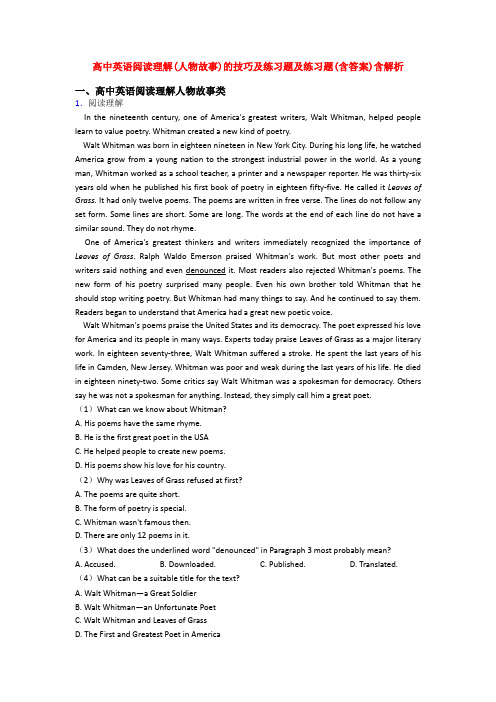
高中英语阅读理解(人物故事)的技巧及练习题及练习题(含答案)含解析一、高中英语阅读理解人物故事类1.阅读理解In the nineteenth century, one of America's greatest writers, Walt Whitman, helped people learn to value poetry. Whitman created a new kind of poetry.Walt Whitman was born in eighteen nineteen in New York City. During his long life, he watched America grow from a young nation to the strongest industrial power in the world. As a young man, Whitman worked as a school teacher, a printer and a newspaper reporter. He was thirty-six years old when he published his first book of poetry in eighteen fifty-five. He called it Leaves of Grass. It had only twelve poems. The poems are written in free verse. The lines do not follow any set form. Some lines are short. Some are long. The words at the end of each line do not have a similar sound. They do not rhyme.One of America's greatest thinkers and writers immediately recognized the importance of Leaves of Grass. Ralph Waldo Emerson praised Whitman's work. But most other poets and writers said nothing and even denounced it. Most readers also rejected Whitman's poems. The new form of his poetry surprised many people. Even his own brother told Whitman that he should stop writing poetry. But Whitman had many things to say. And he continued to say them. Readers began to understand that America had a great new poetic voice.Walt Whitman's poems praise the United States and its democracy. The poet expressed his love for America and its people in many ways. Experts today praise Leaves of Grass as a major literary work. In eighteen seventy-three, Walt Whitman suffered a stroke. He spent the last years of his life in Camden, New Jersey. Whitman was poor and weak during the last years of his life. He died in eighteen ninety-two. Some critics say Walt Whitman was a spokesman for democracy. Others say he was not a spokesman for anything. Instead, they simply call him a great poet.(1)What can we know about Whitman?A. His poems have the same rhyme.B. He is the first great poet in the USAC. He helped people to create new poems.D. His poems show his love for his country.(2)Why was Leaves of Grass refused at first?A. The poems are quite short.B. The form of poetry is special.C. Whitman wasn't famous then.D. There are only 12 poems in it.(3)What does the underlined word "denounced" in Paragraph 3 most probably mean?A. Accused.B. Downloaded.C. Published.D. Translated.(4)What can be a suitable title for the text?A. Walt Whitman—a Great SoldierB. Walt Whitman—an Unfortunate PoetC. Walt Whitman and Leaves of GrassD. The First and Greatest Poet in America【答案】(1)D(2)B(3)A(4)C【解析】【分析】本文是一篇人物介绍,介绍了美国著名的诗人Walt Whitman以及他的代表作《草叶集》。
2019-2020年高中英语阅读理解 第三部分 名人故事(一)练习
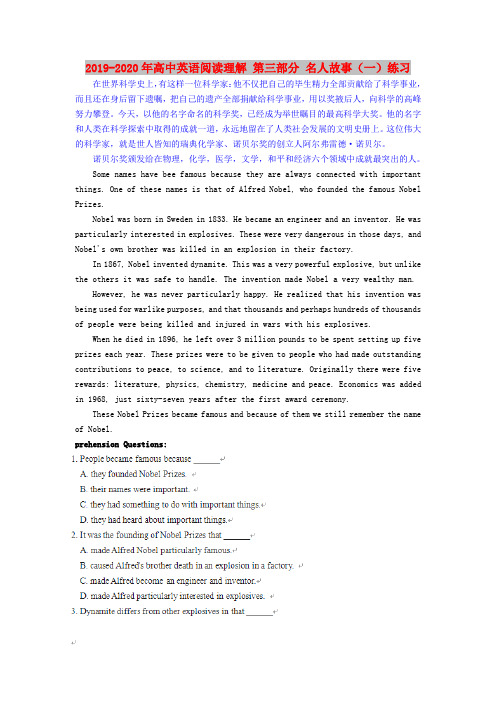
2019-2020年高中英语阅读理解第三部分名人故事(一)练习在世界科学史上,有这样一位科学家:他不仅把自己的毕生精力全部贡献给了科学事业,而且还在身后留下遗嘱,把自己的遗产全部捐献给科学事业,用以奖掖后人,向科学的高峰努力攀登。
今天,以他的名字命名的科学奖,已经成为举世瞩目的最高科学大奖。
他的名字和人类在科学探索中取得的成就一道,永远地留在了人类社会发展的文明史册上。
这位伟大的科学家,就是世人皆知的瑞典化学家、诺贝尔奖的创立人阿尔弗雷德·诺贝尔。
诺贝尔奖颁发给在物理,化学,医学,文学,和平和经济六个领域中成就最突出的人。
Some names have bee famous because they are always connected with important things. One of these names is that of Alfred Nobel, who founded the famous Nobel Prizes.Nobel was born in Sweden in 1833. He became an engineer and an inventor. He was particularly interested in explosives. These were very dangerous in those days, and Nobel's own brother was killed in an explosion in their factory.In 1867, Nobel invented dynamite. This was a very powerful explosive, but unlike the others it was safe to handle. The invention made Nobel a very wealthy man.However, he was never particularly happy. He realized that his invention was being used for warlike purposes, and that thousands and perhaps hundreds of thousands of people were being killed and injured in wars with his explosives.When he died in 1896, he left over 3 million pounds to be spent setting up five prizes each year. These prizes were to be given to people who had made outstanding contributions to peace, to science, and to literature. Originally there were five rewards: literature, physics, chemistry, medicine and peace. Economics was added in 1968, just sixty-seven years after the first award ceremony.These Nobel Prizes became famous and because of them we still remember the name of Nobel.prehension Questions:A. it is less powerful and safe to handle.B. it is more powerful but less safe to handle.C. it is both powerful and safe.D. it won't kill people.4. Rich as he was, Alfred Nobel was never particularly happy because ______A. his dynamite was not safe enough.B. his explosives were being used in wars.C. his brother was killed by the explosives invented by him.D. he had killed hundreds of thousands of people with explosives.5. Those who had made outstanding contributions to peace, to science and to literature ______A. could get three million pounds.B. were given five prizes each year.C. could see Alfred Nobel himself.D. could receive Nobel Prizes.(CACBD)About George Washington将军和下士—乔治•华盛顿的故事乔治·华盛顿,美国首任总统(1789~1797),美国独立战争大陆军总司令。
【英语】 英语阅读理解(人物故事)专题练习(及答案)
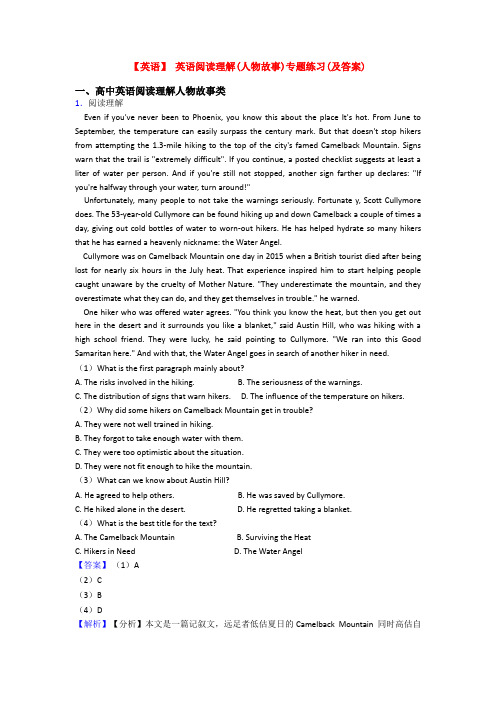
【英语】英语阅读理解(人物故事)专题练习(及答案)一、高中英语阅读理解人物故事类1.阅读理解Even if you've never been to Phoenix, you know this about the place It's hot. From June to September, the temperature can easily surpass the century mark. But that doesn't stop hikers from attempting the 1.3-mile hiking to the top of the city's famed Camelback Mountain. Signs warn that the trail is "extremely difficult". If you continue, a posted checklist suggests at least a liter of water per person. And if you're still not stopped, another sign farther up declares: "If you're halfway through your water, turn around!"Unfortunately, many people to not take the warnings seriously. Fortunate y, Scott Cullymore does. The 53-year-old Cullymore can be found hiking up and down Camelback a couple of times a day, giving out cold bottles of water to worn-out hikers. He has helped hydrate so many hikers that he has earned a heavenly nickname: the Water Angel.Cullymore was on Camelback Mountain one day in 2015 when a British tourist died after being lost for nearly six hours in the July heat. That experience inspired him to start helping people caught unaware by the cruelty of Mother Nature. "They underestimate the mountain, and they overestimate what they can do, and they get themselves in trouble." he warned.One hiker who was offered water agrees. "You think you know the heat, but then you get out here in the desert and it surrounds you like a blanket," said Austin Hill, who was hiking with a high school friend. They were lucky, he said pointing to Cullymore. "We ran into this Good Samaritan here." And with that, the Water Angel goes in search of another hiker in need.(1)What is the first paragraph mainly about?A. The risks involved in the hiking.B. The seriousness of the warnings.C. The distribution of signs that warn hikers.D. The influence of the temperature on hikers.(2)Why did some hikers on Camelback Mountain get in trouble?A. They were not well trained in hiking.B. They forgot to take enough water with them.C. They were too optimistic about the situation.D. They were not fit enough to hike the mountain.(3)What can we know about Austin Hill?A. He agreed to help others.B. He was saved by Cullymore.C. He hiked alone in the desert.D. He regretted taking a blanket.(4)What is the best title for the text?A. The Camelback MountainB. Surviving the HeatC. Hikers in NeedD. The Water Angel【答案】(1)A(2)C(3)B(4)D【解析】【分析】本文是一篇记叙文,远足者低估夏日的Camelback Mountain 同时高估自己的能力,所以在远足途中遇到麻烦,Cullymore了解情况后决定帮助他们。
高中英语阅读理解(人物故事)解题技巧和训练方法及练习题(含答案)含解析

高中英语阅读理解(人物故事)解题技巧和训练方法及练习题(含答案)含解析一、高中英语阅读理解人物故事类1.阅读理解A photography exhibition by French artist San Bartolome entitled Moon Door Dreamers opened in the 798 Art Zone in Beijing on December 10, 2011, presenting a cross-cultural perspective (视角) on ordinary life in the capital city.Bartolome took these photos in August 2008, and produced a video named Two Worlds, One Dream. These works were displayed in Pingyao, an ancient city in Shanxi Province, under the title Beijing Midsummer Night Dream in September 2010.The moon doors serve as a keyhole through which one can catch a glimpse of a slice of Beijing life. He got his inspiration from one cycling trip to the southeastern suburb of Beijing, where he discovered a peculiar street along which a gray brick wall was built to cover the shabby bungalows. These cabins were mostly rented by migrant workers- peddlers, craftsmen, grocers and innkeepers.Born in 1950, Bartolome has worked as a photographer, stage director. Artistic manager, writer and diplomat. A noted Sinophile, Bartolome frequently visits China for photographic subjects. In the fall of 2003, he joined the French Embassy in Beijing as a cultural attache. His work experience in China from 2003 to 2015 further enhanced his awareness of and love for China.Bartolome not only loves Chinese culture but also the Chinese people. He thinks that Chinese people are kind, welcoming and diverse.Back from his bike ride to southeastern Beijing, he decided to shoot pictures about ordinary urban lifestyles. He observed dwellers carefully and made friends with them.After about 30 days and nights that he spent with these common migrants, he created a number of portraits. Meanwhile, he learned more about those rural migrants who earn their living in a city with which they are unfamiliar.He adopted an optimistic perspective to shoot the sights, and he borrowed the title of one of William Shakespeare s comedy works: A Midsummer Night's Dream.(1)What is the main purpose of the exhibition?A. To present Bartolome's photographic skills.B. To tell us Bartolome's work experience in Beijing.C. To show us Bartolome's optimistic view on ordinary life in Beijing.D. To build a cross-cultural communication bridge between China and France.(2)What inspires Bartolome to shoot pictures about ordinary urban styles?A. His bike ride to Southeastern suburb of Beijing.B. His work experience in the French Embassy in Beijing.C. His visit to the ancient city of Pingyao.D. Shakespeare's comedy work: A Midsummer Night's Dream.(3)What does the underlined word "Sinaphile" in paragraph 4 refer to?A. A successful artist.B. A cultural attache.C. A person of status.D. A fan of China.(4)What does the text mainly talk about?A. A French artist tells Chinese stories with his camera.B. A French artist frequently visits China for photography.C. Migrant workers live a simple but happy life in Beijing.D. Moon Doors serve as a window to display China to the world.【答案】(1)C(2)A(3)D(4)A【解析】【分析】本文是一篇记叙文,法国艺术家圣巴托洛姆在北京798艺术区举办的名为"月亮之门梦想家"的摄影展,从跨文化角度呈现了普通城市的生活以及拍摄的原因。
2019-2020年高中英语阅读理解第三部分名人故事(三)练习

马克•吐温,真名塞姆•朗赫恩•克列门斯( Samuel Langhorne Clemens ),是美国的幽默大师、小说家、作家,亦是著名演说家。
短篇小说《百万英磅》、《竞选州长》和长篇《哈克贝里•芬历险记》、《汤姆•索亚历险记》最为人们所称道。
海伦•凯勒曾言:“我喜欢马克吐温一一谁会不喜欢他呢?即使是上帝,亦会钟爱他,赋予其智慧,并于其心灵里绘画出一道爱与信仰的彩虹。
”威廉•福克纳称马克•吐温为“第一位真正的美国作家,我们都是继承他而来”。
One of the best known America n writers is Samuel Lan ghor ne Cleme ns, whose penname is Mark Twain. Born in 1855, Twain grew up in the Mississippi River town of Hannibal, Missouri. As did many other boys of his day, Twain dreamed of traveling on riverboats and of someday being a riverboat pilot. Twain used his memories of the life of a river town in his two most famous books, the Adventures of Huckleberry Finn and the Adventures of Tom Sawyer .As a young man Twain held many jobs. He was a printer, a gold miner, and for a time, he was a riverboat pilot. During his pilot days, he adopted the name Mark Twain. This was a term used by the boatme n to mean that the water measured two fathoms, or twelve feet, which was deep eno ugh for safe passage.Finally Twain became a successful writer. He traveled a great deal, writing andspeak ing, and became very popular both in the Un ited States and in Europe.Twain's style of writing was simple and direct. Amongthe things he wrote about were superstitious people and people who were easily fooled. He used his unu sual gift for humor to write about many things of importa nee.prehe nsion Questi ons:1. Samuel Lan ghor ne Cleme ns ___A. was as famous as Mark Twain.B. is better known tha n Mark Twain.C. grew up in the Mississippi River town of Hannibal with Mark Twain as his friend.D. was used by Mark Twain as his pen n ame.2. Many boys of that time ______ ■A.wanted io become famous wTiters.+B.wanted to be passengers on the Mississippi.*C.wished to friends of Mark "RvamD.anxious To ^vork on a riverboat.3. The name Mark Ivvain came into use________ *A.when Samuel Langhorne Clemens was a printersB.when lie was Borlaug on a riverboat. *-C.before he became a.gold miner. *D.^'hen he wai taught what the term meant.4. fathoms, or twelve is ___________ ◎A. a term to indicate Mark Twain.B. a depth at which boats can safely pass.C. was used by boatme n to measure the depth of water.D. con sidered to be deep eno ugh for pilots to swim across the river.5. Twain ' s style of writing is ___ ___A. humorousB. simpleC. direct D all of the above.(DDBBD)查尔斯?狄更斯一英国最伟大的作家之一查尔斯•狄更斯,是英国文学史上唯一可与莎士比亚媲美的伟大作家。
- 1、下载文档前请自行甄别文档内容的完整性,平台不提供额外的编辑、内容补充、找答案等附加服务。
- 2、"仅部分预览"的文档,不可在线预览部分如存在完整性等问题,可反馈申请退款(可完整预览的文档不适用该条件!)。
- 3、如文档侵犯您的权益,请联系客服反馈,我们会尽快为您处理(人工客服工作时间:9:00-18:30)。
第三部分名人故事(三)11. Mark Twain, Welcome American Humorist马克•吐温—受欢迎的美国幽默作家马克·吐温,真名塞姆·朗赫恩·克列门斯(Samuel Langhorne Clemens),是美国的幽默大师、小说家、作家,亦是著名演说家。
短篇小说《百万英磅》、《竞选州长》和长篇《哈克贝里·芬历险记》、《汤姆·索亚历险记》最为人们所称道。
海伦·凯勒曾言:“我喜欢马克吐温——谁会不喜欢他呢即使是上帝,亦会钟爱他,赋予其智慧,并于其心灵里绘画出一道爱与信仰的彩虹。
”威廉·福克纳称马克·吐温为“第一位真正的美国作家,我们都是继承他而来”。
One of the best known American writers is Samuel Langhorne Clemens, whose pen name is Mark Twain. Born in 1855, Twain grew up in the Mississippi River town of Hannibal, Missouri. As did many other boys of his day, Twain dreamed of traveling on riverboats and of someday becoming a riverboat pilot. Twain used his memories of the life of a river town in his two most famous books, the Adventures of Huckleberry Finn and the Adventures of Tom Sawyer.As a young man Twain held many jobs. He was a printer, a gold miner, and for a time, he was a riverboat pilot. During his pilot days, he adopted the name Mark Twain. This was a term used by the boatmen to mean that the water measured two fathoms, or twelve feet, which was deep enough for safe passage.Finally Twain became a successful writer. He traveled a great deal, writing and speaking, and became very popular both in the United States and in Europe.Twain's style of writing was simple and direct. Among the things he wrote about were superstitious people and people who were easily fooled. He used his unusual gift for humor to write about many things of importance.Comprehension Questions:1. Samuel Langhorne Clemens ______A. was as famous as Mark Twain.B. is better known than Mark Twain.C. grew up in the Mississippi River town of Hannibal with Mark Twain as his friend.D. was used by Mark Twain as his pen name.A. a term to indicate Mark Twain.B. a depth at which boats can safely pass.C. was used by boatmen to measure the depth of water.D. considered to be deep enough for pilots to swim across the river.5. Twain’s style of writing is ______A. humorousB. simpleC. directD. all of the above.(DDBBD)12. Charles Dickens, One of the Greatest English Writers查尔斯•狄更斯—英国最伟大的作家之一查尔斯·狄更斯,是英国文学史上唯一可与莎士比亚媲美的伟大作家。
1812年2月7日生于朴次茅斯市郊,1870年6月9日卒于罗切斯特附近的盖茨山庄。
一生共创作长篇小说13部半,其中多数是近百万言的大部头作品,中篇小说20余部,短篇小说数百篇,以及大量演说词、书信、散文、杂诗。
其中,《圣诞颂歌》、《大卫·科波菲尔》、《双城记》最为人们所称道。
他多次去欧洲大陆游历、旅居,两次访问美国。
When Charles Dickens was a small boy, he was sent by his parents to work in a boot-blacking factory. His parents had other children and many debts to pay.Charles's father was put into prison for his debts. The boy tried to raise money enough to get him out but was unsuccessful. At last, the whole family went to live with Charles's father in his room in the Marsalsea prison. This was a common practice and, while the prisoner could not leave the grounds, the families could go in and out freely until the gate was locked at night.For the rest of his days, Dickens was interested in prisons. Whenever he traveled through strange towns and cities, he went to visit them, as other tourists would visit museums and palaces. Almost every book he wrote has a prison and some prisoners in it.He had been born in 1812 and had stayed busy at one kind of work or another from the time he was six years of age. He died of a sudden stroke in 1870. He provided the world with its clearest picture of the texture of English life during the 1800's, one without which readers would never know the sounds, smells, and tastes of those long-ago days.A. the boy couldn't raise enough money.B. he couldn't return the money he had borrowed from others.C. the boy was unsuccessful in making enough money in the boot-blacking factory.D. the boy was too small to save him.3. The common practice of those days was ______A. the family should go to live together with the prisoner.B. the family members should remain in prison until the prisoner was set free.C. the family members could stay with the prisoner and have freedom to leave or enter the prison in the daytime.D. the family members could go in and out of the prison at any time.4. The difference between Charles Dickens and other tourists lies in that ______A. he liked to visit prisons while others didn't.B. he liked to visit palaces while others didn't.C. he was not interested in prisons while others were.D. others showed more interest in prisons than him.5. If you read Charles Dickens’s novels, you can ______A. see a clearest picture.B. hear the sounds, enjoy the smells and tastes of those long-ago days.C. know very clearly what the life of the nineteenth century England was like.D. know clearly how he and his family lived in the prison.(BBCAC)13. Goethe, Germany’s Greatest Poet歌德—德国最伟大的诗人约翰·沃尔夫冈·歌德(1749-1832),是18世纪中叶到19世纪初德国和欧洲最重要的作家、诗人。
